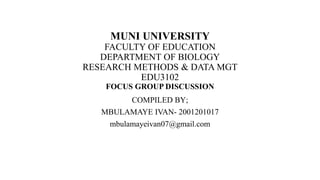
FOCUS GROUP DISCUSSION.pptx
- 1. MUNI UNIVERSITY FACULTY OF EDUCATION DEPARTMENT OF BIOLOGY RESEARCH METHODS & DATA MGT EDU3102 FOCUS GROUP DISCUSSION COMPILED BY; MBULAMAYE IVAN- 2001201017 mbulamayeivan07@gmail.com
- 3. Introduction • Focus Group Discussion (FGD) involves gathering people from similar backgrounds or experiences together to discuss a specific topic of interest. • It is a form of qualitative research where questions are asked about their perceptions, attitudes, beliefs, opinion or ideas. • Participants are free to talk with other group members. • FGD generally involves group interviewing in which a small group of usually 6 to 10 people are involved. 1/29/2023 3 mbulamayeivan07@gmail.com
- 4. Cont. • It is led by a moderator (interviewer) in a loosely structured discussion of various topics of interest and includes a note taker. • Should be between 60 and 90 minutes. If the FGD is shorter than 60 minutes, it is often difficult to fully explore the discussion topic and if it is longer than 90 minutes, the discussion can become unproductive. 1/29/2023 4 mbulamayeivan07@gmail.com
- 5. Purposes of FGD Gathering opinions, beliefs, and attitudes about issues of study interest Encouraging discussion about a particular topic Providing an opportunity to learn more and deeply about a topic or issue Testing your theoretical assumptions Interpreting quantitative research results 1/29/2023 5 mbulamayeivan07@gmail.com
- 6. Public attitudes (e.g., workplace equality, social relations) Personal behaviors A new product being introduced to the market A political candidate Research topics for FGD 1/29/2023 6 mbulamayeivan07@gmail.com
- 7. Organization of FGD Before FGD • Define the objectives. • Establish a timeline. • Identify the participants • Generate the questions • Develop a script/plan of the whole session • Select a facilitator • Choose the location • Conduct the focus group. During FGD • Set the tone; participants should have fun and feel good about the session. • Make sure every participant is heard; draw out quieter group members. • Get full answers. • Monitor time closely; don’t exceed time limits. • Keep the discussion on track; try to answer all or most of the questions. • Head off exchanges of opinion about personal lives. 1/29/2023 7 mbulamayeivan07@gmail.com
- 8. After FGD; Interpret and report results. Summarize each meeting individually Analyze the summaries Write the report
- 9. Advantages of FGD • Easy to setup • Fast and relatively inexpensive • Free and open discussion among the respondents results in generation of new ideas that can be very useful for decision- making • Expressions other than those in verbal form such as gestures and stimulated activities can provide researcher with useful insights. • Detailed information about personal and group feelings, perceptions and opinions can be obtained. 1/29/2023 9 mbulamayeivan07@gmail.com
- 10. Cont. • A focus group is not static and very flexible. The moderator can bring any changes in order to better facilitate the discussion during the group discussion allowing better results in terms of information derived by a focus group. • Captures real life data in a social environment • Researcher can increase sample size for qualitative research 1/29/2023 10 mbulamayeivan07@gmail.com
- 11. Disadvantages of FGD • Small, non-representative samples. • Results are not projectable. • Lack of anonymity (no protection of the privacy of those who voluntarily participate) • It might not accurately represent the views of the larger population • Participants can feel pressured to conform to the views of the larger group. • Participants might intentionally lie about their views 1/29/2023 11 mbulamayeivan07@gmail.com
- 12. Cont. • Moderator bias can creep into focus group activity either intentionally or inadvertently (without intention). • The data analysis is more difficult to be done. • It is not based on a natural atmosphere (artificial environment). • The researcher has less control over the data generated. • It demands interviewers who are carefully trained. • It takes effort to assemble groups. 1/29/2023 12 mbulamayeivan07@gmail.com
- 13. Cont. • The discussion should be conducted in an atmosphere that facilitates the dialogue. • Capturing major issues can be difficult • There will be increase in time and cost if in case more than one language is used. • Focus groups can vary (talkative, quiet, dull, dominating) and may deviate from actual topic. • Respondents may be reluctant to share some sensitive ideas and concerns publicly. 1/29/2023 13 mbulamayeivan07@gmail.com
- 14. Cont. • Some research topics are unsuitable for focus group environments. For example, topics which are seen as too personal (such as living with HIV/AIDS, sexuality, infertility). • In institutional contexts (such as the workplace or schools), people may be reluctant to express their opinions or discuss their personal experiences in front of colleagues. If the objective of the research is to generate in-depth personal narratives such as the experience of infertility or illness, focus groups may not be appropriate. 1/29/2023 14 mbulamayeivan07@gmail.com
- 15. Cont. • Offers a shallower understanding of an issue than those obtained from individual interviews. • In some focus groups, due to the presence of some group members, the participants may feel to intimidate to speak. 1/29/2023 15 mbulamayeivan07@gmail.com
- 16. References. • Bartunek, J. M., & Seo, M. G. (2002). Qualitative research can add new meanings to quantitative research. Journal of Organizational Behavior, 23(2), 237-242. • Andrew, P., & Jonathan, T. (2006). Focus group method and methodology: Current practice and recent debate. International Journal of Research & Method in Education, 29, 23– 37. 1/29/2023 16 mbulamayeivan07@gmail.com